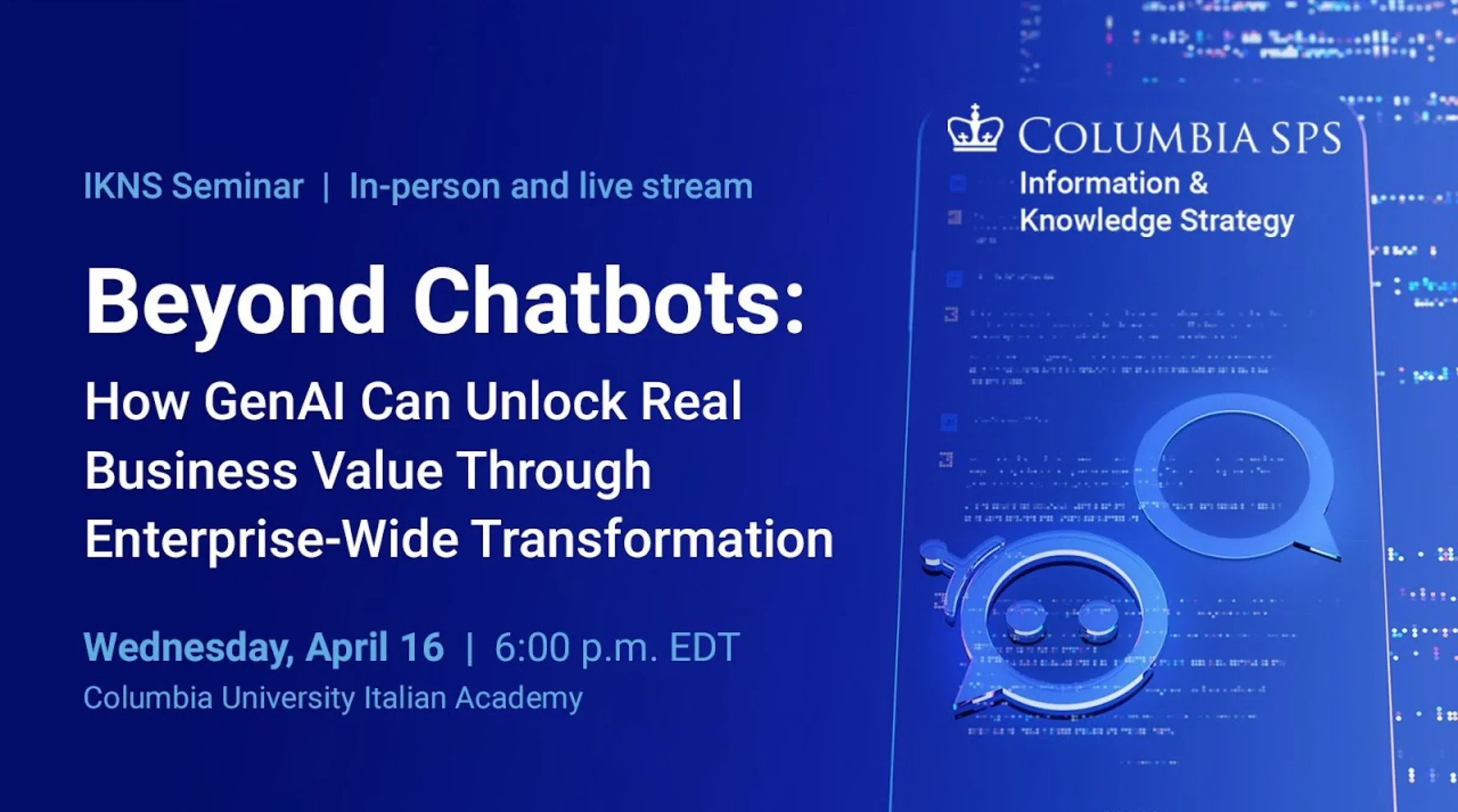“In the age of information, the real power lies not just in knowing, but in knowing how to act wisely.”
With these words, Katherine Koontz, lecturer in the M.S. in Information & Knowledge Strategy (IKNS) program and former Global Head of Data and AI for Healthcare and Life Sciences at Amazon Web Services, set the tone for the recent IKNS Seminar and networking reception. The event was held in person on Columbia’s campus and also live-streamed, with a combined audience of several hundred industry experts, faculty, students, and alums. Koontz teaches Leading Business Analytics, one of the core courses in IKNS’ curriculum area Data & Analytics, which also includes courses in Artificial Intelligence, Digital Product Design, as well as a diverse set of electives.
Drawing on three decades of leadership in data, analytics, and artificial intelligence, Koontz invited attendees to step into the evolving space between data overload and decisive action—a space where generative AI and intelligent agents are redefining the future of work.
Beyond Chatbots: How GenAI Can Unlock Real Business Value Through Enterprise-Wide Transformation offered a grounded yet forward-looking examination of how generative AI is moving beyond chatbots to become a powerful force in automating complex processes, enhancing decision-making, and creating sustainable competitive advantage.
“Each system has its own interface, its own logic, its own language—and the human becomes the integration point,” said Koontz. “Rather than just automating individual tasks, generative AI transforms work by eliminating entire categories of what I call ‘swivel-chair’ activities: the constant, manual effort of switching between systems to stitch information together.”

Katherine Koontz, lecturer in the M.S. in Information & Knowledge Strategy (IKNS) program, speaks at the “Beyond Chatbots” seminar.
Generative AI is poised to become the intelligent bridge across disconnected enterprise systems, offering not just efficiency gains but a fundamental reimagining of how work gets done. By maintaining contextual continuity across siloed platforms, generative AI allows professionals to focus on creativity and decision-making rather than redundant, low-value tasks. Its applications stretch across industries, from strengthening supply chain resilience in med tech to streamlining predictive maintenance in manufacturing, signaling a shift from traditional business analytics toward cross-domain, adaptive intelligence.
“We’re moving beyond solving isolated, well-defined problems to deploying systems that can reason, infer, and create across entire workflows,” said Koontz. “This isn’t just a step forward—it’s the start of a new operating model for how organizations think and work.”
Drawing on her extensive experience working directly with clients, Koontz introduced several case studies to explain how generative AI can serve as a powerful integrator across multiple siloed systems in complex operations like supply chain management and predictive maintenance. By acting as a natural language interface, AI reduces the need for manual context-switching and navigation between disparate data sources and tools, offering consolidated insights and actionable recommendations. This improves decision-making by providing a holistic view of trade-offs, optimizing scheduling, technician assignments, and repair processes. However, Koontz highlighted significant strategic, organizational, and technical barriers to adoption, emphasizing the importance of treating AI as a business transformation rather than just a technology project. She explained that she is an advocate for iterative product development, cross-functional collaboration, and governance structures tailored to the organization to realize the full value of generative AI.
“The key takeaway is that generative AI acts as a multiplier across existing analytic investments—it’s not about replacing what you have but connecting those siloed pieces of information to drive better, data-driven decision making,” said Koontz.
View a video recording of the full "Beyond Chatbots" seminar below:
About Columbia’s IKNS Degree
The Columbia University M.S. in Information & Knowledge Strategy (IKNS) degree provides students with foundations in information science, organizational psychology, and change management as well as practical skills in project management and executive leadership.
IKNS is available full-time or part-time, online or in-person on Columbia’s landmarked campus right here in New York City. To maximize opportunities for networking and community building, our online students join our New York-based students on Columbia’s campus for three in-person residencies during their studies. The STEM-designated Master of Science degree offers International Students (F-1/J-1 visa) an opportunity for Curricular Practical Training during their studies (CPT) and 3 years of work authorization in the US upon completing their studies (OPT).
Students train under world-class faculty, including former and current executives from Google, IBM, NASA, and Oliver Wyman, and join a powerful global alumni network in coveted positions, including at Alphabet, Goldman Sachs, Nike, Pfizer, and the World Bank.
For more IKNS insights, news, and events, please go to our website, connect with us on LinkedIn, or attend one of our online info sessions. Visit the School of Professional Studies website to learn more about the SPS Student Experience.



